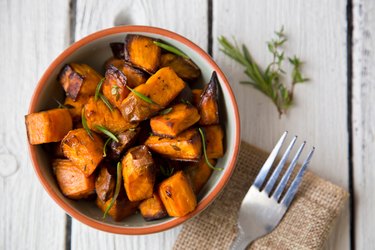
Yams versus sweet potatoes are botanically distinct, although the terms are often used interchangeably. According to the University of California, sweet potatoes are root vegetables, while yams are tubers — vegetables that form at the base of roots.
Read more: Sweet Potatoes and Weight Loss
Video of the Day
Video of the Day
Sweet Potato and Yam Nutrition
According to the USDA, 1 cup of cubed sweet potato contains:
- 130 calories
- 3 grams of protein
- 41 grams of carbohydrates
- 3 grams of fiber
- 16 grams of sugar
While 1 cup of cubed yams contains:
- 155 calories
- 2 grams of protein
- 37 grams of carbohydrates
- 5 grams of fiber
- 0.7 grams of sugar
Yam Vs. Sweet Potato Protein
Neither yams or sweet potatoes are a particularly rich source of protein, a nutrient necessary for muscle building and tissue repair. As with most plant sources of protein, the proteins in yams and sweet potatoes do not provide all the essential amino acids your body needs.
According to Cedars-Sinai Medical Center, one benefit of plant proteins is that they aren't associated with an increased risk of heart disease as many animals proteins are. However, animal proteins are considered to be the highest-quality protein sources.
Count Carbohydrates and Fiber
Both yams and sweet potatoes offer plentiful carbohydrates — 42 grams for yams and 41 grams for sweet potatoes per 1 cup serving. Fiber is abundant in both vegetables as well, with yams supplying 6 grams and sweet potatoes 4 grams.
Carbohydrates provide your body with sugars, its preferred fuel source, making both yams and sweet potatoes good sources of energy. Fiber, although not digestible, improves your gastrointestinal health and helps to control blood sugar levels, according to Harvard T.H. Chan School of Public Health.
Forget the Fat
Both yams and sweet potatoes are very low-fat foods, with less than half a gram of fat per serving. The low-fat content of yams and sweet potatoes may help you keep your total fat intake in check.
However your body requires some dietary fat to ensure a healthy intake of fat-soluble vitamins and to keep your cell membranes in good working order. Consider cooking or preparing the yams and sweet potatoes with olive oil, vegetable oil, or canola oil for a healthy intake of fats in your diet.
Get Your Vitamins and Minerals
Sweet potato nutrition includes high vitamin A content. A 1 cup serving of sweet potato supplies 1840 micrograms of this vitamin while the same amount of yams only supplies 8 micrograms.
According to the National Academies of Sciences, the recommended daily allowance for vitamin A for women is 700 micrograms and 900 micrograms for men. One serving of sweet potato provides more than 100 percent of your daily vitamin A, while yams provide only 1 percent.
Both vegetables are good sources of vitamin C, vitamin B6, thiamine and pantothenic acid. Vitamin C helps your body repair wounds and damaged tissues, and vitamin B6, thiamine and pantothenic acid work to metabolize your food and keep your cells in good condition, according to Harvard Health.
Sweet potatoes and yams provide essential minerals, including potassium and copper. Potassium helps with energy production and muscle contraction, while copper plays a role in the synthesis of collagen, hemoglobin and melanin.
- Cedars-Sinai Medical Center: "Are Animal Proteins Better for You Than Plant Proteins?"
- Harvard T.H. Chan School of Public Health: "Fiber"
- National Academies of Sciences: "Vitamins and Minerals"
- Harvard Health Publishing: "Listing of Vitamins"
- University of California: "Sweet Potato or Yam?"
- USDA FoodData Central: "Sweet Potato, Frozen, Cooked, Baked, Without Salt"
- USDA FoodData Central: "Yam, Cooked, Boiled, Drained, or Baked, With Salt"